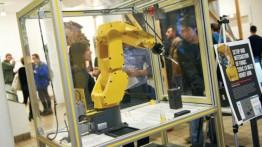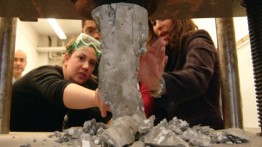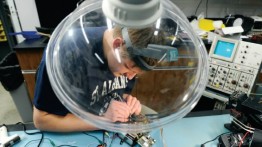Master's Degree Requirements
The Cooper Union offers a Master of Engineering degree with areas of concentration in chemical engineering, civil engineering, electrical engineering, and mechanical engineering. The integrated bachelor/master of engineering program is intended to integrate work at the undergraduate and graduate levels and prepare graduates for entry into the engineering profession at an advanced level or for further graduate study.
See the application guidelines for the admissions procedure.
Cooper Union students applying for the 4 year undergraduate/graduate dual degree see instructions for application below.
See the course list for graduate level courses.
See the 2025-2026 Master of Engineering Student Handbook and the current Master of Engineering Brochure.
General Application Requirements
Applicants who are not Cooper Union graduates are expected to have a superior undergraduate record and to have given evidence of ability for independent work. Students are accepted on an academically competitive basis subject to the availability of an advisor and of suitable available facilities. Students have up to five years to complete their degree. They must declare whether they plan to pursue the thesis or non-thesis option by the end of their third year or when they complete 24 credits, whichever comes first. Once students declare the thesis option, they have four semesters to finish the program. Students may complete the degree requirements as part-time or full-time students in consultation with their advisor. Students receiving more than 50% scholarship or are in receipt of a Fellowship may be required to complete their degree on a different timeline.
Cooper Union Undergraduates A Cooper undergraduate degree does not guarantee admission to the graduate program. To be considered for admission to the master’s program, one must be a currently enrolled Cooper Union undergraduate, with a minimum 3.0 grade point average according to the major.
Integrated degree: All Cooper undergraduates looking to earn their Master's degree at Cooper fall within the integrated degree program. In an integrated program, there is only one transcript for the Bachelor of Engineering and Master of Engineering coursework, with one cumulative GPA. There are two types of integrated degrees:
1. The Dual degree: The Cooper Union Dual Degree Master’s Program is one in which the bachelor’s and master’s degree are awarded simultaneously after four years of study. Only the thesis option is available for the Dual degree. With the approval of their advisor, students apply credits from courses taken beyond those required for the Bachelor of Engineering towards the requirements for the Master’s degree. In the dual degree program, a student’s status remains as an “undergraduate” throughout the program, until award of the bachelor’s and master’s degree. To maintain undergraduate status, students are required to enroll in a minimum of 12 credits that are applied to the undergraduate degree each term.
Students interested in the dual degree program should NOT submit an application to the graduate program via the admissions site. Instead, students should submit the Dual Degree Notification Form in the second semester of their junior year. The form is available from Beth Slack who will need to know the names of your undergraduate academic advisor, graduate thesis advisor, and the chair of the department in which you are pursuing your master's degree.
2. 4+ degree: The Cooper Union 4+ Master's Program is one in which a Cooper Union undergraduate student completes the undergraduate degree, receives the diploma and then begins the graduate degree program. Students interested in the 4+ degree should apply to the Master of Engineering program via the admissions site in one of the degree-granting departments during their senior year.
Graduates of Other Colleges The School of Engineering may admit outstanding students or qualified practicing professionals, on a tuition basis, into the master’s degree programs. To be considered for admission, a student should have completed an engineering baccalaureate program that is accredited by the Accreditation Board for Engineering and Technology (ABET). In addition, an essay is required of all applicants who were not Cooper Union graduates. Applicants must submit official transcripts. Graduates of foreign institutions whose first language is not English are required to submit scores of the Test of English as a Foreign Language (TOEFL). Admitted students may be required to register for advanced engineering courses to make up for any deficiencies.
Degree Requirements
The Albert Nerken School of Engineering offers both thesis and non-thesis Master of Engineering degrees. A minimum of 30 graduate level credits beyond the baccalaureate degree must be completed at The Cooper Union (in addition to resolving possible undergraduate deficiencies) for both the thesis requiring M.E. Program and the non-thesis M.E. Program. All graduate level credits, including possibly cross-listed upper level undergraduate credits, must be approved by a student’s academic advisor(s). A complete program of study is designed by the student with the assistance and approval of the academic advisor(s) and filed in the Office of the Dean of Engineering.
Each student is required to submit a thesis or project in their area of study, equivalent to a maximum of six credits (graduate level), for partial fulfillment of the master of engineering requirements. This project must be discussed with and approved by an advisor prior to being started. The thesis or project must be successfully presented orally by the student and submitted in written form.
Each of the engineering departments may have additional specific guidelines for the requirements for the M.E. degree. See links for Masters Program found under each department.
Thesis Requirements
The 30 credits offered for the thesis program degree must satisfy the following distribution:
- Major: Complete a minimum of 12 credits of graduate level courses in a chosen field
- Complete a minimum of 12 further credits of graduate level courses.
- Thesis Project: 6 credits
All four departments offer the thesis option.
Non-Thesis Requirements
The 30 credits offered for the non-thesis program degree must satisfy the following distribution along with a special project requirement:
- Major: Complete a minimum of 18 credits of graduate level courses in a chosen field
- Complete a minimum of 12 further credits of graduate level courses
Special Projects requirement can be fulfilled in one of two ways:
- Complete a graduate level independent study course (up to 3 credits)
- Submit a report to the Dean’s office of other course work that satisfies requirements for a graduate level course in which a grade of “B” or higher was received. If your home department has specific guidelines for the Special Projects requirement report, you should follow those guidelines. If there are no guidelines from your department, the Deans office suggests these basic structure and formatting requirements.
When the special projects requirement is completed, the Non-Thesis Special Projects Approval Form should be filled out and submitted, along with any report, to the Dean’s office. Please contact Beth Slack to request the form.
The Department of Chemical Engineering does not offer the non-thesis option at this time.
Other General Requirements
Grade Requirement A minimum overall grade point average of 3.0 is needed in all courses used to satisfy the 30 credit master’s degree requirement.
Appropriate Excess Credits Taken as an Undergraduate For Cooper Union baccalaureate holders, any credits of graduate level, taken as undergraduates in excess of their bachelor’s degree requirement, may be applied to the master’s degree, subject to the above cross-listing requirements and advisor approval.
Time Limitation Once students have declared they are following the thesis or non-thesis track, they must complete the program within four semesters. Students receiving less than 50% scholarship must declare no later than the end of their sixth semester of enrollment. Students who receive more than 50% scholarship are required to be full-time students, and must complete the program in either four or five semesters, dependent on their department's requirements. Students who request and are granted an extension beyond the four, five or ten semesters of expected enrollment will be assessed a maintenance of matriculation fee of $3,000 per semester.
Graduate Tuition & Fees
See the tuition and fees page.
Enders Fellowship
One source of funding available to students wishing to pursue graduate study in engineering is the Enders Fund, governed by the will of Henry C. Enders and administered by the New York Community Trust. This fellowship is available to engineering graduates of The Cooper Union who have satisfactorily completed all required chemistry courses in the ChE curriculum and plan to do graduate work in chemistry, chemical engineering, chemistry-based environmental engineering, or chemistry-based bioengineering. Recipients are selected by the joint faculties of chemistry and chemical engineering.
The Department of Chemical Engineering requires that any recipient of the Enders Fellowship be a full-time student pursuing their Masters in Engineering and must follow the “thesis option” (research path). Applicants are reviewed by the chemical engineering and chemistry faculties and are evaluated based on their academic merit, desire to do research, and research topic interests.
Application for Enders Students who wish to be considered for the Enders Fellowship should submit the following materials as a single *.pdf file to the Engineering Dean’s Office by February 15th of the year they would like to receive the fellowship:
- Curriculum Vitae / Resume (1-2 pages)
- Personal statement (1-2 pages, explain your goals in pursuing a masters and how the fellowship would help you)
- Statement of Research Interests (1-2 pages on your previous research experience, future projects of interest, and potential faculty you could work with)
- Transcript for bachelor's degree (can be “unofficial” from DTSS)
Students may reapply for the fellowship. Students will be notified of their award by the end of March and must accept or reject the fellowship offer in writing to the Engineering Dean’s Office by April 15th.








